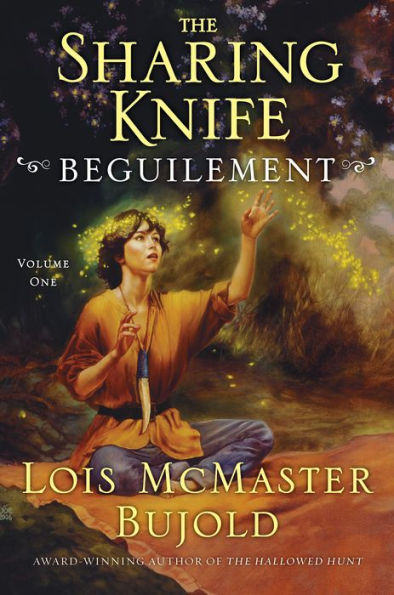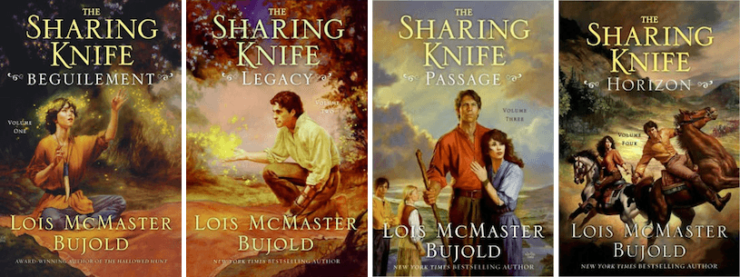Lois McMaster Bujold’s Sharing Knife tetralogy never, I think, equalled the popularity and recognition of her Miles Vorkosigan novels or her World of the Five Gods work (Curse of Chalion, Paladin of Souls, The Hallowed Hunt, and the Penric and Desdemon novellas…) but it remains, for me, a revelation about the kinds of stories that it is possible to tell in fantasy, and the struggles it is possible to reflect.
Many fantasy novels involve potentially world-ending threats, and supremely dangerous entities that must be fought. But for most of them, the threat is a discrete thing, a single sprint or at most an occasionally-recurring marathon, not an endless relay handed on through generations of unrelenting vigilance and constant, quotidian, repetitive work, where the margins for error are unforgiving but every disaster must be recovered from, with enough strength left over to go straight back to work.
Buy the Book


Beguilement
In the world Bujold draws in the Sharing Knife books (Beguilement, Legacy, Passage, Horizon, and the novella Knife Children), malices, otherwise known as blight bogles, pose a threat to all life. They hatch and drain life from their surroundings, and suborn—and create—animals and humans to further their ability to drain life from further away. As they grow, they molt—their first stage is sessile, but with every molt they gain more abilities, and with every life they consume they learn more. At first they operate on little more than instinct, but the more mature a malice is, the more dangerous it is. Their origins are lost to history, but there’s no telling where or how often a juvenile malice might emerge. Only constant patrolling by the Lakewalker people has a chance of catching malices while they’re still young enough that the threat is moderate, but the Lakewalkers are always stretched and have more ground to cover than people to cover it, and it takes a lot of Lakewalkers to support a patroller in the field.
In recent years, the Lakewalkers have had to come to terms with settled folk—that Lakewalkers call “farmers,” although they include people who do other work than agricultural—moving into and settling land that hasn’t been entirely cleared of malices. Lakewalkers have innate abilities that farmers don’t, which are to some degree heritable, and which are necessary to their endless work. The difference in abilities is compounded by a difference in cultures and outlooks. But without integration, over time conflict will become inevitable.
In the Sharing Knife books, Bujold holds very large problems which come to the boil on time scales longer than a single human life—long, slow, systemic, and when it comes to people and cultures, complicated problems—to the forefront, while balancing that vast scale with the intimacy of two individuals, one farmer and one Lakewalker, whose problems of forging a relationship across their different cultures (and perhaps holding open the possibility that relationships like theirs don’t have to cut the Lakewalker side off from their people) are personal and immediate.
The solutions to the slow, systemic problems are the work of more than a single human life, or even generations, and will give rise to different problems. Life is change and life is growth. The personal problems that face Fawn Bluefield, farmer, and Dag Redwing Hickory Oleana, Lakewalker, are related to those larger problems. The Sharing Knife tetralogy is almost anthropological in how it uses a focus on the individual to make larger social, world-scale issues understandable. And while its narrative focus on Dag and Fawn—and their work at making a space in the world that welcomes relationships like theirs, that makes them fruitful, and gives hope for mutual understanding between separate communities—forms the structure for the events of the books, in terms of theme, the Sharing Knife always has one eye on that longer, larger horizon.
In one sense, the Sharing Knife books are intimate, measured, domestic things: part romance, part travelogue, a tiny personal story in a wide green world. (Their closest successor in terms of emotional scale is probably Katherine Addison’s The Goblin Emperor.) But in another, its epic scale is staggeringly large: as large as climate change and colonialism, and all the other long, slow problems we know whose ongoing effects are generations in the making, and more generations in the solving. The only way to approach that kind of scale in fiction is through the tiny and the personal, I think, and here Bujold does it astoundingly well.
Liz Bourke is a cranky queer person who reads books. She holds a Ph.D in Classics from Trinity College, Dublin. Her first book, Sleeping With Monsters, a collection of reviews and criticism, was published in 2017 by Aqueduct Press. It was a finalist for the 2018 Locus Awards and was nominated for a 2018 Hugo Award in Best Related Work. Find her at her blog, or find her at her Twitter. She supports the work of the Irish Refugee Council, the Transgender Equality Network Ireland, and the Abortion Rights Campaign.










